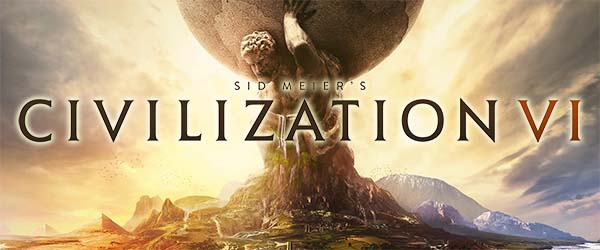
The announcement trailer for Sid Meier's Civilization VI made me very excited. Not just because there was a new iteration of my favorite PC game franchise, but also because the message of the trailer made me excited for the possibility that Civilization VI would take a much more humanist and globalist approach to its gameplay and victory conditions.
The Civilization games have always had a very optimistic tone, treating human development as being constantly progressing forward. Growing your civilization and building more things is almost always better. For the most part, Civilization treats human history as a constant forward march towards a better, more prosperous tomorrow.
This is despite the games including mechanics for "Dark Ages", climate change, nuclear fallout, occasionally pandemics and plagues, and so forth. Regardless of these mechanics, the civilizations of the game never regress, unless it's by the sword or gun of a conquering civilization, in which case, that other civilization is glorified. Climate change or nuclear winter can run rampant and render the surface of the Earth borderline uninhabitable for modern human life, but a civilization can still accumulate enough science or tourism or faith or diplomatic votes to win one of the various victories, or they can be the sole surviving civilization, presiding over a barren wasteland. But it's still a win.
Civilization is a game about cutthroat nationalism.
Despite vague gestures towards diplomatic cooperation and solving global crises, Civilization is, at its core, a game of competitive, cutthroat, zero-sum nationalism. This design ethos is probably the result of Civilization's inspirations coming from competitive board games like Avalon Hill's Civilization and Risk. "Our country is better than your country," and the whole game is an exercise in proving that. Further, one civilization's success must come at the expense of every other civilization's failure, even if those civilizations are friends or allies. One civ wins; all others lose. Every decision made is done to move your civilization closer towards one of those victory conditions, and every diplomatic agreement, trade deal, or alliance that you strike is only a temporary means to that end.
So what did Civ VI's trailer do to change my expectations for that game?
This essay is also available in video format on YouTube.
The trailer
Well, first, it's important to know how previous trailers and intro cinematics for Civilization games had introduced their respective games. Usually, they emphasized a single nation or leader doing great things. Winning wars, building wonders, developing advanced technologies, and so forth. And they usually ask the viewer: "How will you run your civilization?" and "Will your civilization stand the test of time?"
The trailer for Civilization VI takes a different approach. Let's take a look:
Civilization VI's announcement trailer celebrates the collective achievements of all of humanity.
"We are the explorers, the inventors, the architects of change, the builders of a better tomorrow.
We strive, we dream, we inspire, always towards something greater.
All the odds we defy, the risks we take, the challenges we endure, only make us stronger.
There's no end to our imagination, and no limit to civilization."
- Sean Bean narrating Civilization VI announcement trailer
Notice the language that is used. The Civ VI trailer uses plural language such as "we", "us", and "out". "We are the builders of a better tomorrow.". "the challenges we endure, only make us stronger." "There is no end to out imagination, and no limit to civilization.". And so forth. The trailer for Civilization VI isn't a celebration of one civilization or leader rising above all others and being crowned the "greates" civilization; it's about the collective achievement of all of humanity -- not a civilization, but all human civilization!
It's a beautifully humanistic expression that emphasizes plurality and doesn't elevate any one culture or race or nation above any other. It celebrates the collective technological advancements, engineering, art, and struggles of all of humanity, without implying that any one nation or group has the best stuff. It emphasizes that we can overcome challenges by working together, and come out the other side stronger for it. It implies that when we cooperate to build something or solve a problem, the result will be better than what any individual entity can accomplish. [More]

This will be the second part of a 2-part Retrospective on Civilization VI. The first part features my personal list of Top 10 Good Ideas that Firaxis put into the game, and this second part will be the Top 10 Bad Ideas. If you haven't read the Good Ideas yet, then I highly recommend you check that out first, as there will be several topics in this list that will build on what was said in the previous list. In fact, there will be some topics that are appearing in both lists, so I hope you'll read the good things that I have to say before reading the bad.
I also don't want to be a complete downer, and would like to provide constructive feedback. So wherever possible, I will try to make suggestions on how I think Firaxis could improve on some of these ideas if they chose to revisit them for future games. And some of these ideas are certainly worth re-visiting.
This content is also available in video essay format via YouTube.
[More]
07ea0b45-5d98-4ac1-9e2c-064bddd336aa|1|5.0
Tags:Civilization VI, Civilization VI: Rise and Fall, Civilization VI: Gathering Storm, Civilization VI: New Frontiers Pass, Sid Meier's Civilization, retrospective, top 10, privateer, pirate, world congress, agenda, leader, museum, trade route, wall, diplomacy, disaster, climate change

With the New Frontiers Pass for Civ VI over, an "Anthology" edition of Civ VI on sale, and no news at all regarding future DLC or expansions, I'm assuming that Firaxis has finished with Civ VI. As such, I want to look back on the game and reflect on the things that I liked most about it, and the things that annoyed me the most.
After the lifespan of Civilization V had ended, I wrote up a pair of retrospective blogs about my personal Top 10 Good Ideas and Top 10 Bad Ideas that went into that game. I'll be doing the same thing now with Civ VI.
I want to stress that this is a list of 10 good and bad ideas -- not necessarily good and bad mechanics. Some of the good ideas will be ideas that I like in principle (or on paper), but which might need more iteration before they truly work as intended. In contrast, there may be some bad ideas that work fine mechanically, but which hurt the "flavor" or theming of the game, in my opinion.
This is, of course, a subjective list of personal favorite and disliked concepts in the game. I'm sure there will be a lot of disagreement, and some of the things I write here will probably be somewhat controversial with the rest of the player base. So I'm interested in reading others' feedback. So if you agree with any of my points, or you vehemently disagree, feel free to post a comment and share your thoughts.
This content is also available in video essay format via YouTube.
This first post will cover my personal Top 10 Good Ideas, and I will follow it up with the next post being about the Top 10 Bad Ideas. [More]
549df3d2-8086-446d-bb11-35103ccef5b9|1|5.0
Tags:Civilization VI, Civilization VI: Rise and Fall, Civilization VI: Gathering Storm, Civilization VI: New Frontiers Pass, Sid Meier's Civilization, retrospective, top 10, music, Christopher Tin, Baba Yetu, agenda, wall, scout, skirmisher, ranger, diplomacy, alliance, disaster, climate change, barbarian, city state, leader

Firaxis has released the final "New Frontiers" update for Civilization VI. This update from March 2021 includes the new civilization Portugal, lead by João III.
If Firaxis decides to launch a second "New Frontiers" season, I will continue to write guides for the new civilizations and leaders. I will also put up polls on Patreon to let my Patrons decide which civ or leader to cover first (if Firaxis gives enough advance notice).

If "New Fontiers" is the end of the life cycle of Civilization VI, then don't fret. If I get enough interest from my Patrons, I'll also write guides for the "New Frontiers" game modes, or go back and create / update guides for legacy leaders. We also have new games such as Old World and Humankind coming out. I'll be playign both games when they release on Steam, and can also write guides for those games, if my supporters ask for it.
Portugal rose to prominence during the "Age of Discovery" in the 15th and 16th centuries, exploring the world and becoming the first global maritime empire. It established colonies and/or outposts in Brazil, Africa, India, and east Asia, it monopolized the spice trade, and was responsible for the formalization of the division of the globe into hemispheres. Portugal's dominion was short-lived however. A devastating earthquake in Lisbon in 1755, followed by occupation by Napoleonic France, and the eventual independence of Brazil combined to collapse the Portuguese maritime empire.

Portugal's maritime empire was laregely secured by King João III "The Pious" during his reign in the first half of the 16th century. João III established the first European colonies in Brazil and began importing Brazilwood into Europe, which was popular for creating red dyes. He was considered a scholar, humanist, and diplomat who supported the arts, granted scholarships to foreign universities, and remained neutral in wars between other European powers. But history is never so black-and-white, and João III is no exception. He also imported South American slaves into Europe from Brazil, and he boosted Portugal's relationship with the Vatican by allowing the Inquisition to establish itself in Portugal.
DISCLAIMER:
Civilization VI is still a "living game". Strategies for the game (and for specific leaders and civs) may change as Firaxis applies balance patches, introduces new features, or expands the game through further DLC or expansion packs, or as the Civ community discovers new strategies or exploits. As such, the following strategy guide may change from time to time. I will try to keep it up-to-date, and will make notations whenever changes are made. I'll also post links in the official 2K forums and CivFanatics, where I'll also report any changes made. If possible and practical, I will try to retain the original content of the strategy for posterity.
I welcome any feedback or suggestions that readers wish to offer. Feel free to post on the linked forums, or by posting a comment at the bottom of the page.
This guide is up to date as of the release of the [final] "New Frontiers" April 2021 Update (ver. 1.0.12.9)
João III explores the map to meet all other civilizations and city states, and will seek to establish peaceful trade relations with all of them, including constructing trade infrastructure in those other civilizations' cities. [More]
2a321222-ca59-47b4-8957-6177b584e9a1|0|.0
Tags:Sid Meier's Civilization, Civilization VI, Portugal, Portuguese, Joao III, casa da India, porta do cerco, navigation school, nau, caravel, feitoria, navigator's legacy, campus, navy, trade route, exploration, diplomacy, first contact

Last year, after my initial enthusiasm for Civilization VI began petering out (until the announcement of the expansion), I went on a bit of a space-4x bender. I spent some time with the rebooted Master of Orion. It was good, but I was underwhelmed by its limited scale and casual depth. I also planned on hitting up Endless Space 2. I played the first Endless Space briefly off-and-on, and I liked it, but kept getting diverted to other games and projects and never really allowed myself the time to get comfortable with the game.
But first, before diving into Engless Space 2, I wanted to tackle a game that's been in my library for over a year: Stellaris. This is an epic, space 4x strategy game developed by Paradox Interactive -- the same developer who brought us the infamously complex and detailed Europa Universalis and Crusader Kings series.
A gentler learning curve than Europa Universalis
I was hesitant to try Stellaris because of its relationship to Europa Universalis (and its notorious complexity), but I was surprised to find that Stellaris has a bit of a gentler learning curve. Instead of starting you out "in median res" with a developed European kingdom with armies already mobilized, alliances and rivalries already in place, and wars already in progress, Stellaris starts you out in control of a single planet in a single star system, with just a small fleet of corvettes, a construction ship, and a science ship at your disposal. You send your science ship to explore the other planets in your system, then on to the nearest star, and slowly explore from there at a much more comfortable pace that is akin to a game like Civilization or Master of Orion. Unlike with Crusader Kings and Europa Universalis, I didn't feel like I needed to sit down with a history textbook in order to know what was going on at the start of my game.
You start the game with a single science ship to explore your own star system, and work your way out from there.
Don't let this initial apparent simplicity fool you. Stellaris is still quite deep, quite complex, and the galaxy that you'll explore really does feel vast. While the Master of Orion reboot has galaxies with a mere dozens of stars (very few of which contain more than one or two planets), Stellaris features a default galaxy size consisting of hundreds of stars, most with their own planets, which might (in turn) contain moons.
There's still going to be some trial and error, as you'll make a lot of mistakes and miss a lot of opportunities in your first few games. If you left the "ironman" mode disabled, then you'll at least be free to re-load earlier saves and try to play better if anything goes horribly wrong. However, Paradox throws a bit of a curve ball at players by disabling achievements if you disable ironman mode. You won't stumble into achievements in your learning game(s) or by save-scumming; you'll have to earn them in the Ironman mode!
You also won't be able to manually save while in Ironman mode. You have to wait for the game to perform an auto-save (which I think happens every few in-game months, or maybe every year?). This can be very annoying if you don't notice the "saving game" popup and don't know if the game has saved your most recent actions. It's fine to include a single save file for this mode, but they could at least include a "Save and Exit" option in the pause menu! [More]
2caf8b87-93d3-4596-b06c-1db37d776061|0|.0
Tags:Stellaris, Paradox Interactive, strategy, grand strategy, 4x, science fiction, space, faster than light, hyperspace, wormhole, anomaly, research, terraforming, war, diplomacy, Master of Orion, patch, Skinner Box, Star Trek: Birth of the Federation
|

| 12 | | | | | | | 60 | | 11 | | | | | | | 55 | | 10 | | | | | | | 50 | | 09 | | | | | | | 45 | | 08 | | | | | | | 40 | | 07 | | | | | | | 35 | | 06 | | | | | | | 30 | | 05 | | | | | | | 25 | | 04 | | | | | | | 20 | | 03 | | | | | | | 15 | | 02 | | | | | | | 10 | | 01 | | | | | | | 05 |
|